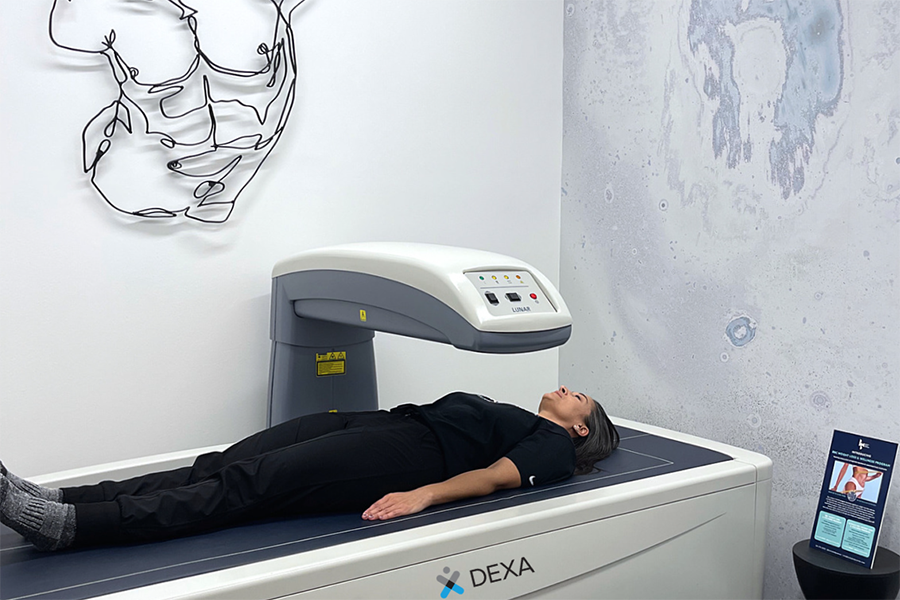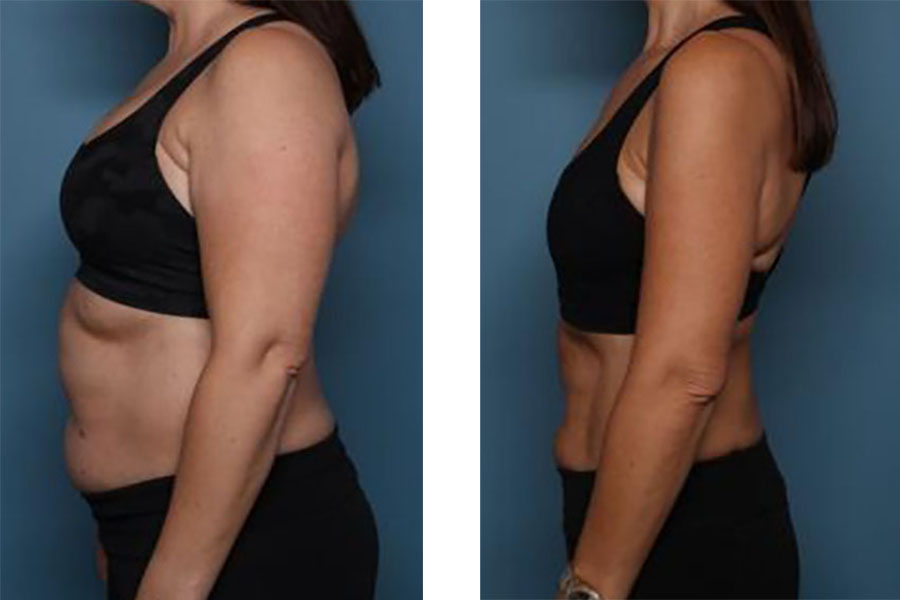A Philly Physician Explains What’s Real and What’s Not When It Comes to Medically Assisted Weight Loss Injections

Who among us hasn’t resolved to eat healthier and exercise more in the New Year, only to ditch the plan within the first week of January? As we’ve all come to learn, diets don’t work, but many of us continue to fruitlessly and frustratingly look for long-term solutions to help us get physically fit.
Well, 2024 could be that year, thanks to a recent medical breakthrough that’s transforming how the medical community approaches weight management. Weight loss injections like Semaglutide, Wegovy and Ozempic have made headlines for their success in helping people lose weight, with the potential for long-lasting results. Administered through weekly injections, semaglutide helps regulate blood sugar, reduce appetite and slow digestion. In simpler terms, it helps you reduce your caloric intake without the food obsession and incessant hunger that often come with fad diets.
“I think semaglutide programs for weight loss are going to revolutionize the problems of obesity and difficult weight loss currently and in the future,” says Dr. Louis Bucky, founder of The Bucky Body Center in Philadelphia, which now offers a medically assisted weight loss program with semaglutide injections. “There’s a large population that has weight-loss issues relative to hormonal and genetic triggers that keep them heavy, making weight loss more difficult. This new addition of semaglutide, or what they call GLP-1 agonists, is proving to be tremendously successful for people who need to lose weight.”
Still, with so much noise around weight loss management, many adults have questions about the promise of semaglutide and its long-term effectiveness. From side effects to accessibility and affordability, Dr. Bucky answers the most common questions around semaglutide and discusses why a comprehensive, medically assisted weight management program might be a life-changing solution for you.
Is Medically Assisted Weight Loss Right for Me?
The traditional recipe for shedding weight has always been calorie restriction and increased activity. For many individuals, that formula isn’t sustainable. For others, it simply doesn’t work.
“Weight loss, historically, has been considered something where people, if they can’t lose weight, they don’t have discipline,” Dr. Bucky says of the false notions around weight management. “We have our own internal triggers for hunger, stress and other things. There’s no doubt that exercise and reduced caloric intake have a big impact on that, but it’s much more complex than that.”
Understanding that complexity, Dr. Bucky opened Bucky Body Center in Rittenhouse Square in 2020. The 5,000-square-foot facility offers a wide variety of treatments and individualized care to improve the body’s appearance, athletic performance, physical recovery and overall wellness. Add to that a new Medical Weight Loss and Wellness Program. It’s a comprehensive experience that incorporates medical expertise, body composition analysis, nutrition, exercise and semaglutide injections. And it leverages state-of-the-art medical technology to customize treatment plans and monitor results.
Patients at The Bucky Body Center aren’t looking for dramatic weight loss or to reverse medical conditions like diabetes, Dr. Bucky says. Most are individuals looking to lose weight in a healthful fashion and make lifestyle changes that will lead to long-term results.
“The most common patients that we see are young mothers who’ve had children, and weight has been redistributed,” he says. “It’s also perimenopausal and postmenopausal women, or men throughout their journey who start to get central fat and can’t get rid of it.”
A common result among the patients while in the program, he adds, is that they’re simply happier.
“It’s not just because they’re losing weight; it’s because they don’t have food or exercise on their brain all the time,” he says. “Patients who struggle with their weight are continually thinking about what should I eat? How much do I need to go to the gym? So, once we start them on this, it takes that away from them. And their brain has an opportunity to think about other things instead of their weight issue. It controls a bigger part of one’s mindset than we realize. And that’s translated into a happier patient.”

But is it safe?
Since its FDA approval for weight loss in 2021, chatter around the safety and side effects of semaglutide has grown on social media. But Dr. Bucky points to the stats: Of the 117 clients who’ve been in the program, only one didn’t tolerate the injections.
“Experience is essential,” Dr. Bucky says. “We continue to monitor and review our results.”
Part of the program’s success is the seasoned team of experts who support clients throughout the process. Dr. Bucky, an internationally renowned plastic surgeon and founder of Bucky Plastic Surgery, serves as the medical director. Also on staff are a nutritionist and a physical trainer who does functional pattern and biomechanic training, as well as a nurse and physician assistant who both came from the cardiovascular program at UPenn. “We have your entire safety and well-being covered,” Dr. Bucky says.
All new patients have labs drawn to rule out any significant issues like diabetes, thyroid issues and to check health markers like cholesterol—which, he says, typically improve throughout the program. Measurements are taken, and photography in 360 mode helps clients see what they look like from a whole-body perspective. Most importantly, patients undergo a DEXA Scan that accurately measures lean muscle mass, fat mass and and bone density. Weekly check-ins help monitor clients’ progress, and Dr. Bucky consults with everyone 90 days into the program.
And what about those side effects often talked about in the media—the nausea, vomiting and constipation? At Bucky Body Center, clients start on a very low dose of semaglutide to minimize side effects. “There’s no reason for patients to have that,” Dr. Bucky says. If they can tolerate the dosage and are eating appropriately, they increase the dosage.
“I’m not interested in somebody losing a lot of weight really fast,” he adds. “We try and control this in a healthful way, and that’s very important.”
Will I lose muscle in a medically assisted weight management program?
It’s important to understand that medical weight loss agents like semaglutide are not selective to fat loss. Meaning, if you lose 20 pounds, 10 could be muscle and 10 could be fat.
To combat this in the program, Dr. Bucky uses the state-of-the-art DEXA Scan Body Analysis, which measures visceral fat, external fat, bone density, symmetry and muscle. The scan is done at the outset and later in the program, so Dr. Bucky can ensure clients are on track to lose fat not muscle.
Dr. Bucky initially used the DEXA Scan at Bucky Plastic Surgery to measure the fitness quality of his elective plastic surgery patients and monitor how fat was oriented for liposuction and tummy tuck patients.
“As it turns out, the world of weight loss developed just after I opened the Bucky Body Center,” he says. “And it became clear to me that all the offerings we have in the Body Center, including the DEXA Scan, are ideally suited for individuals who want to lose weight. The measurement of visceral fat, the deep fat, the intra-abdominal fat, is the key piece to healthy weight loss. The only way to reduce that fat is from weight loss.”
The more muscle you have, the more calories you’re burning, Dr. Bucky adds. Muscle maintenance is also key to longevity, preventing falls, preserving bone density and allowing you to be mobile, active and strong as you age.
So how do you maintain or build muscle and target fat loss? Clients in the program must follow a high-protein diet under the supervision of the staff nutritionist and do resistance training during the week. Clients can work out with the trainer at the onsite training center, or with one of the center’s preferred providers in the city. Or clients can work with their own trainers. “As long as it’s resistance and they’re doing it, they should be preserving their muscle mass,” Dr. Bucky says.
Will I have to be on the medicine forever?
The short answer is no. The average weight loss client at Bucky Body Center is on semaglutide for a four-month period—depending on their weight loss goals. At the end of their cycle, clients begin a tapering process to slowly come off the medicine. How long they need to taper or if they need a microdose for a short-term maintenance period is decided on a case-by-case basis. Since clients are typically on lower doses of semaglutide, the tapering process is generally easier.
Coupled with the tapering process is education around exercise, portion control and nutrition that’s built into the program. Those healthy habits are instilled in clients by the time they’ve stopped the injections. Maintaining those lifestyle changes becomes a seamless process for lasting results.

What about the saggy skin or gaunt face that comes with rapid weight loss from semaglutide injections?
While weight loss can leave us feeling better, if it’s too fast, there’s always the possibility of unappealing aesthetic results like sagging skin, unhealthy hair and a gaunt face. Fortunately, it’s not really an issue for clients in the Bucky Body Center program. Since weight loss is designed to be gradual, Dr. Bucky says, unwanted face and body changes are not the norm.
Still, one of the perks of being in the program is access to the non-invasive skin tightening and wellness treatments at Bucky Body Center. This includes Morpheus skin tightening, Cryotherapy (which can burn an extra 600 calories), Compression Therapy, IV Therapy, and Ultimate Body Contour treatments. Clients who participate in the Ultimate BBC Weight Loss & Wellness Program have weekly complimentary access to these services.
Can I afford it?
This, of course, is the million-dollar question. Since the program is not covered by insurance, it’s an out-of-pocket expense. However, Bucky Body Center offers a unique financing option through Privi, which divides payments evenly over 12 months with 0 percent interest.
“The ability to pay this interest free really reduces the hurdle of affordability,” Dr. Bucky says.
Is it worth it?
According to Dr. Bucky, the proof is in the before and after photos. Many of the patients in the weight loss program look like they have had tummy tucks and liposuction at 120 days. “They look that good,” he says. “And the fact that they didn’t have surgery to look that good is amazing.”
Similarly, in looking at the DEXA Scan results, he’s happy that clients are able to reduce fat while preserving or building muscle in the process. “Having performed plastic surgery for 25 years,” he adds, “I have not seen a group of patients as happy as this group because of all the success they’ve achieved.”
This is a paid partnership between Bucky Body Center and Philadelphia Magazine